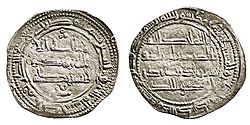Abd-er-Rahman II
| Abd ar-Rahman II | |
|---|---|

Silver dirham coined during the reign of Abd ar-Rahman II.
|
|
| 4th Emir of Córdoba | |
| Reign | 21 May 822–852 |
| Predecessor | al-Hakam I |
| Successor | Muhammad I |
| Born | 792 Toledo |
| Died | 852 (aged 62) Córdoba |
| Father | Al-Hakam I |
| Mother | Halawah |
Abd ar-Rahman II (Arabic: عبد الرحمن الثاني) (792–852) was the fourth Umayyad Emir of Córdoba in the Al-Andalus (Moorish Iberia) from 822 until his death.
Abd ar-Rahman II was born in Toledo, the son of Emir Al-Hakam I. In his youth he took part in the so-called "massacre of the ditch", when from 700 to 5,000 people come to pay homage to the princes who were killed by order of Al-Hakam.
He succeeded his father as Emir of Córdoba in 822 and engaged in nearly continuous warfare against Alfonso II of Asturias, whose southward advance he halted (822–842). In 837, he suppressed a revolt of Christians and Jews in Toledo. He issued a decree by which the Christians were forbidden to seek martyrdom, and he had a Christian synod held to forbid martyrdom.
In 844, Abd ar-Rahman repulsed an assault by Vikings who had disembarked in Cádiz, conquered Seville (with the exception of its citadel) and attacked Córdoba itself. Thereafter he constructed a fleet and naval arsenal at Seville to repel future raids.
He responded to William of Septimania's requests of assistance in his struggle against Charles the Bald's nominations.
Abd ar-Rahman was famous for his public building program in Córdoba where he died in 852. He made additions to the Mosque–Cathedral of Córdoba. A vigorous and effective frontier warrior, he was also well known as a patron of the arts. He was also involved in the execution of the "Martyrs of Córdoba".
...
Wikipedia
